八年级英语上Module11 学案导学课件
文档属性
| 名称 | 八年级英语上Module11 学案导学课件 |
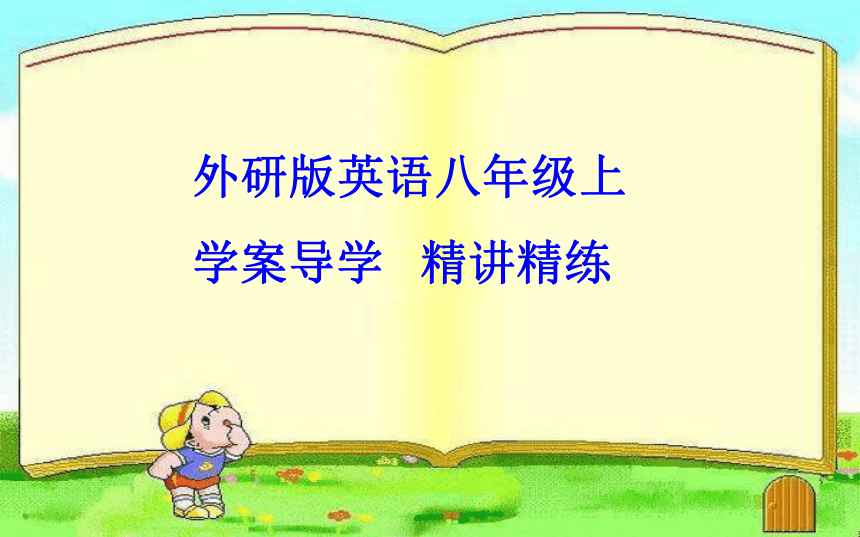
|
|
| 格式 | zip | ||
| 文件大小 | 2.5MB | ||
| 资源类型 | 教案 | ||
| 版本资源 | 外研版 | ||
| 科目 | 英语 | ||
| 更新时间 | 2014-01-24 00:00:00 | ||
图片预览

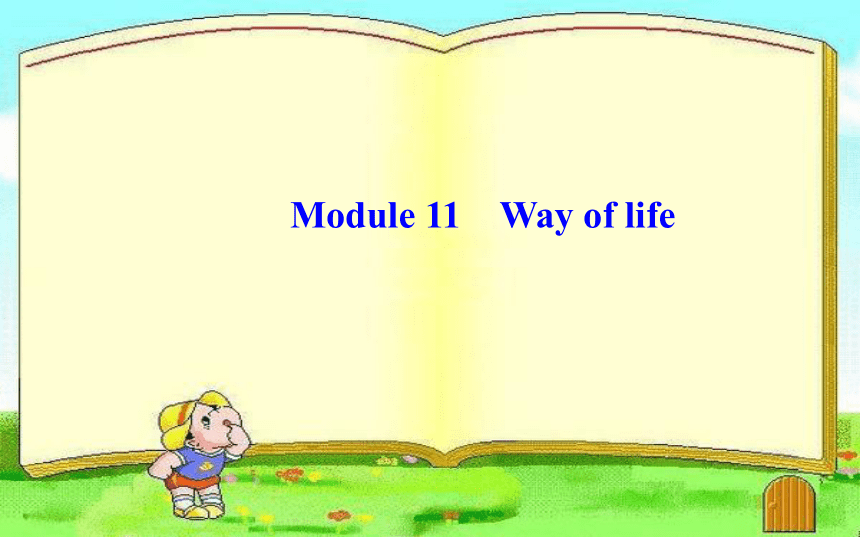
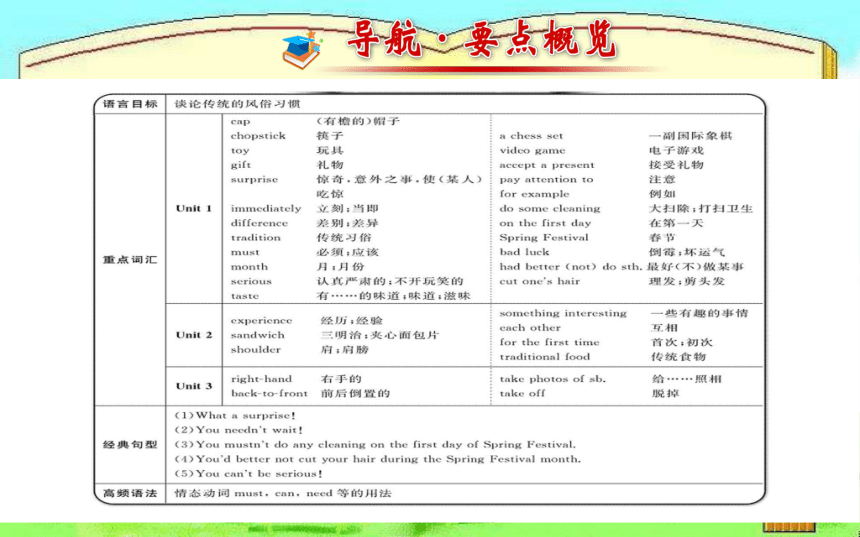
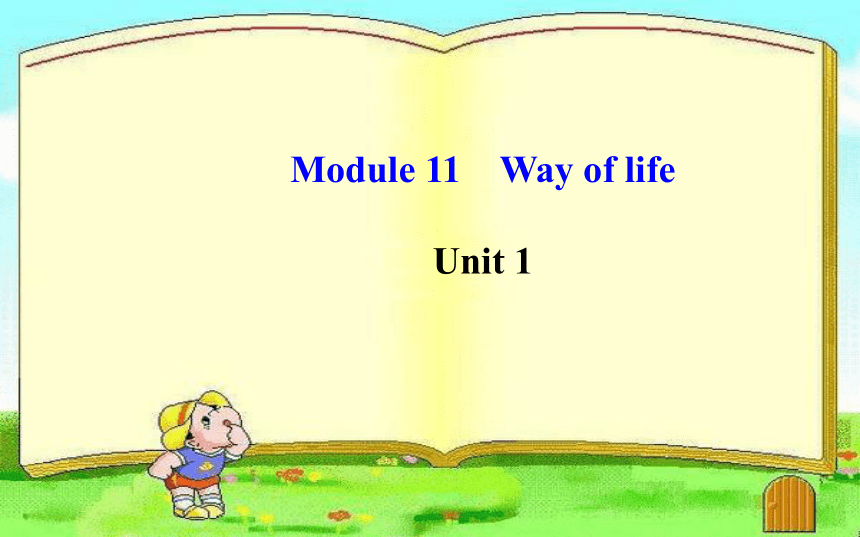
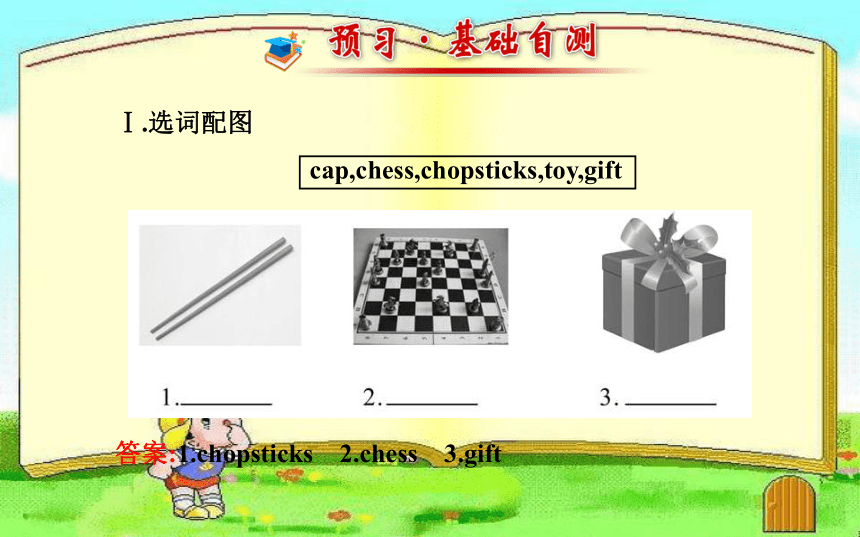
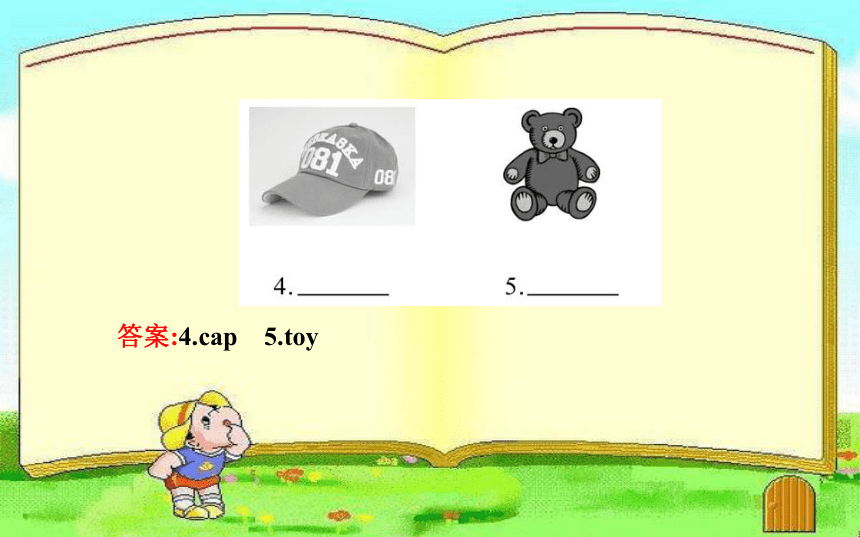
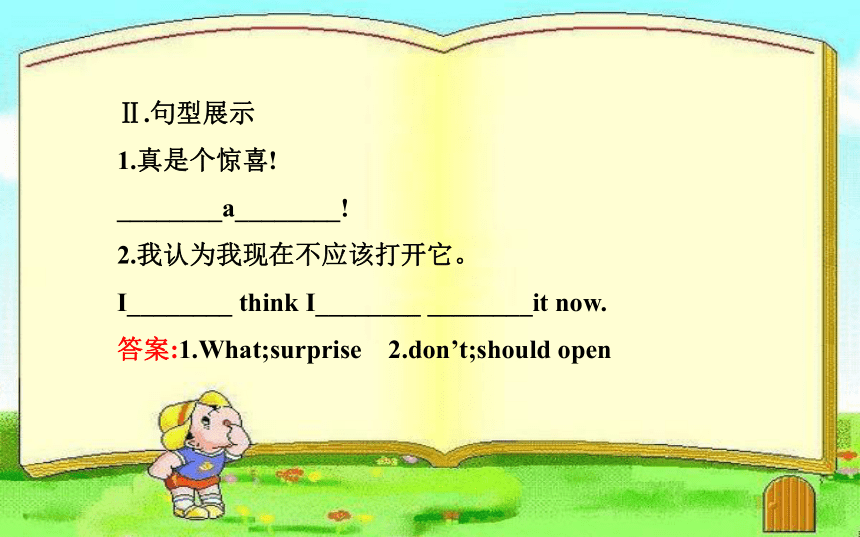
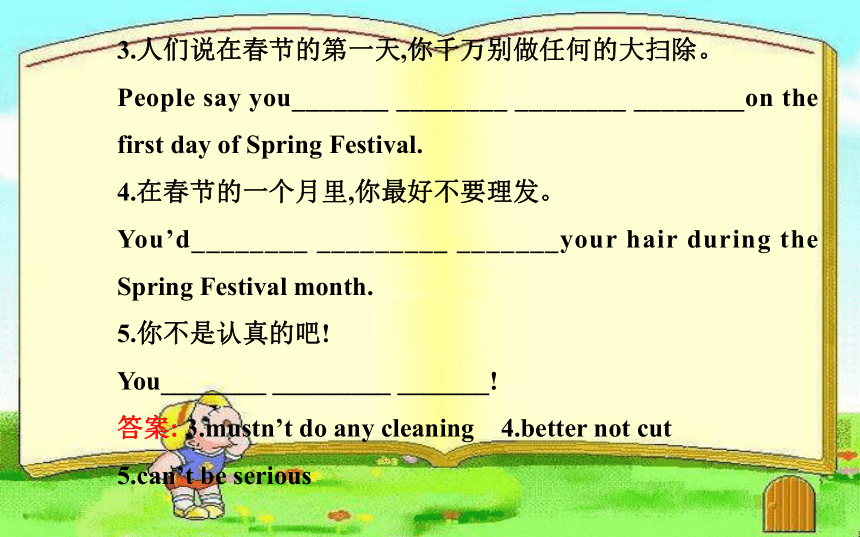
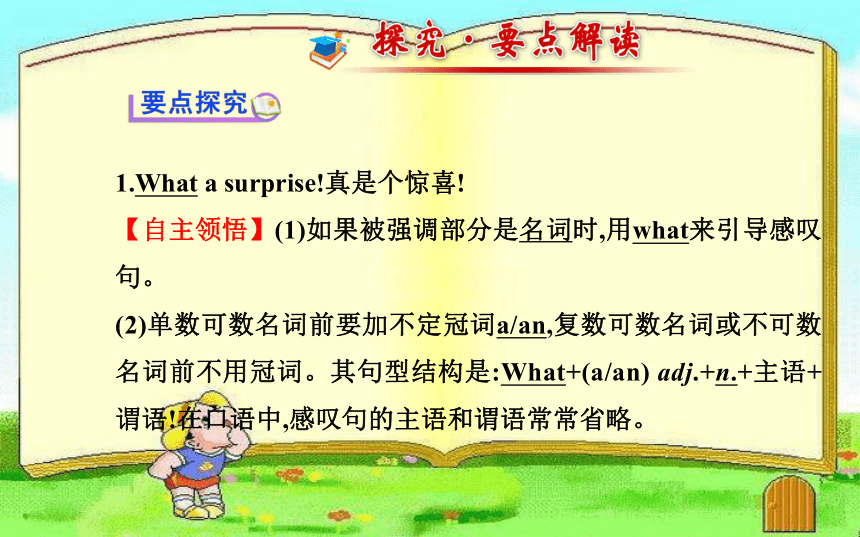
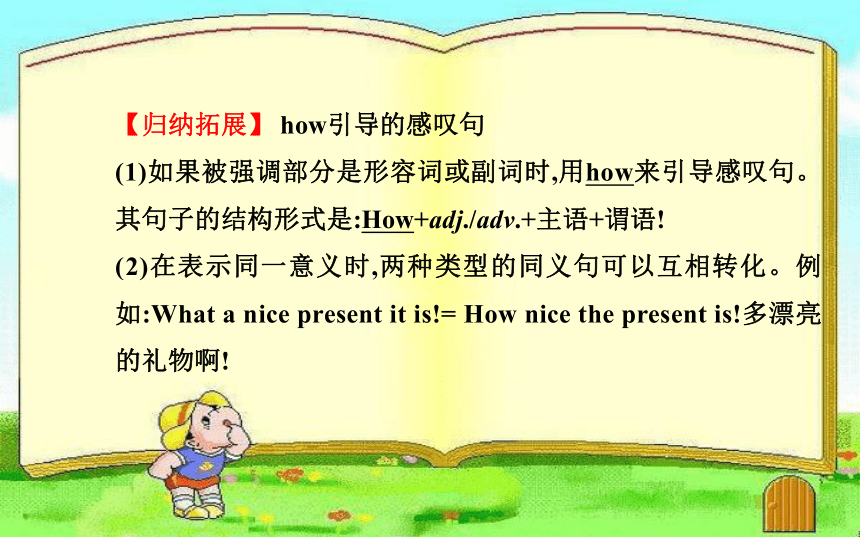
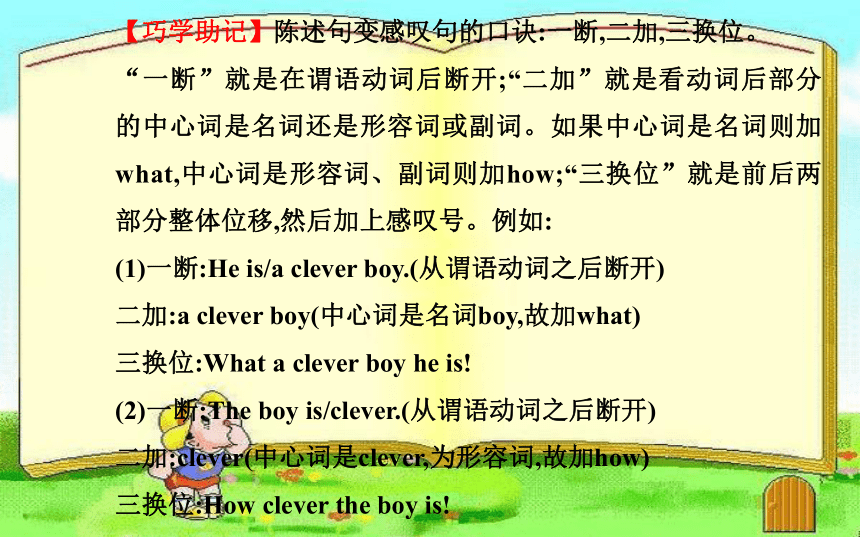
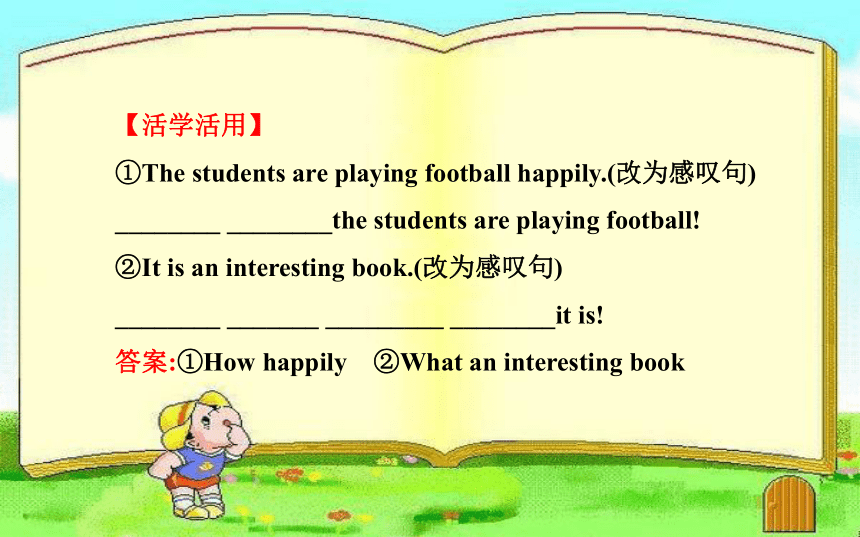
文档简介
课件73张PPT。外研版英语八年级上
学案导学 精讲精练Module 11 Way of lifeModule 11 Way of life
Unit 1 Ⅰ.选词配图
cap,chess,chopsticks,toy,gift
答案:1.chopsticks 2.chess 3.gift 答案:4.cap 5.toy Ⅱ.句型展示
1.真是个惊喜!
________a________!
2.我认为我现在不应该打开它。
I________ think I________ ________it now.
答案:1.What;surprise 2.don’t;should open3.人们说在春节的第一天,你千万别做任何的大扫除。
People say you_______ ________ ________ ________on the first day of Spring Festival.
4.在春节的一个月里,你最好不要理发。
You’d________ _________ _______your hair during the Spring Festival month.
5.你不是认真的吧!
You________ _________ _______!
答案: 3.mustn’t do any cleaning 4.better not cut
5.can’t be serious1.What a surprise!真是个惊喜!
【自主领悟】(1)如果被强调部分是名词时,用what来引导感叹句。
(2)单数可数名词前要加不定冠词a/an,复数可数名词或不可数名词前不用冠词。其句型结构是:What+(a/an) adj.+n.+主语+谓语!在口语中,感叹句的主语和谓语常常省略。【归纳拓展】 how引导的感叹句
(1)如果被强调部分是形容词或副词时,用how来引导感叹句。其句子的结构形式是:How+adj./adv.+主语+谓语!
(2)在表示同一意义时,两种类型的同义句可以互相转化。例如:What a nice present it is!= How nice the present is!多漂亮的礼物啊!【巧学助记】陈述句变感叹句的口诀:一断,二加,三换位。
“一断”就是在谓语动词后断开;“二加”就是看动词后部分的中心词是名词还是形容词或副词。如果中心词是名词则加what,中心词是形容词、副词则加how;“三换位”就是前后两部分整体位移,然后加上感叹号。例如:
(1)一断:He is/a clever boy.(从谓语动词之后断开)
二加:a clever boy(中心词是名词boy,故加what)
三换位:What a clever boy he is!
(2)一断:The boy is/clever.(从谓语动词之后断开)
二加:clever(中心词是clever,为形容词,故加how)
三换位:How clever the boy is!【活学活用】
①The students are playing football happily.(改为感叹句)
________ ________the students are playing football!
②It is an interesting book.(改为感叹句)
________ _______ _________ ________it is!
答案:①How happily ②What an interesting book2.In China, you accept a gift with both hands.
在中国,你用双手接收礼物。
【自主领悟】
both两个;两个都。其反义词是neither。常用短语是both...and...,意为“……和……两个都”,连接两个并列主语时,谓语动词用复数。(其反义短语为neither...nor...,连接两个并列主语时,谓语动词采用“就近原则”)【用法辨析】accept与receive的不同【活学活用】
①My mother gets up early. My father gets up early, too.(合并为一句)
________my mother________ my father________ up early.
②Mr Green________ a present from his friend, but he didn’t ________ it. (receive/accept)
答案:①Both; and; get ②received; accept3.You ’d better not cut your hair during the Spring Festival month.
在春节的一个月里,你最好不要理发。
【自主领悟】
had better(常简略为’d better),意为“最好”,用于表示对别人的劝告、建议或表示一种愿望。其用法如下:
(1)had better do sth.“最好做某事”。例如:Daming, you’d better go there today.大明,你最好今天去那儿。
(2)had better not do sth.“最好不要做某事”。例如:You had better not talk in the reading room.你最好不要在阅览室说话。【活学活用】
①Look at your dirty hands! You_______ _________ ________
(最好洗洗)your hands at once.
②You had better ________(not leave) for Beijing tomorrow,
because it will rain there.
答案:①had better wash ②not leaveⅠ.从方框中选择合适的词并用其适当形式填空
immediately, tradition, chopsticks,
gift, serious
1.Chinese people always use________ instead of knives and forks.
2.Christmas is the________ festival in western countries.
答案:1.chopsticks 2.traditional 3.Nothing________.Take the medicine and have a good rest, and you will be better soon.
4.You have got a high fever. We had better go to hospital
________.
5.On her birthday party she has got plenty of birthday
________.
答案: 3.serious 4.immediately 5.giftsⅡ.单项选择
1.When traffic lights are red, we______ stop and wait.
A.may B.can C.must D.might
2.Your father is sleeping. You had better______.
A.not to make much noise
B.not make much noise
C.not to be quiet
D.to be quiet3.______terrible weather! We have to stay at home.
A.What B.What a C.How D.How a
4.—Would you like some juice or bread?
—______.I’m really thirsty and hungry after such a long walk.
A.Both B.Either C.Nothing D.None
5.Mingming______some gifts on his birthday party yesterday.
A.receive B.received
C.accept D.acceptedModule 11 Way of life
Unit 2Ⅰ.短语互译
1.一些有趣的事情 __________interesting
2.互相 __________other
3.首次;初次 __________the __________time
4.传统食物 __________food
5.have afternoon tea ______________
6.for example ______________
7.push one’s way ______________
答案:1.something 2.each 3.for;first 4.traditional
5.喝下午茶 6.例如 7.挤过去Ⅱ.句型展示
1.比如,初次与人见面时,你必须称呼(他们)先生或女士。
For example, you______ ______Mr or Mrs ______you meet someone_______ _______ _______ _______.
2.下午茶不仅是一种饮品,而且是下午四点左右的一顿便餐。
Afternoon tea is________ ________ a drink________ a light meal at around 4 pm.
答案:1.must say; when; for the first time
2.not just;but3.在英国,鱼和土豆条是传统的食物。
Fish and chips________ ________ ________ ________in England.
4.在公交车站,你绝不允许挤向公交车。
At the bus stop you________ _________ _______ ________
________onto the bus.
答案:3.is the traditional food
4.must not push your way5.你需要在其他人后面站成一行等你的顺序。
You________ ________stand________ ________ ________ behind the other people and wait your turn.
答案: need to; in a line1....I noticed something interesting with the English way of life.
……我注意到了英国生活方式的一些有趣的东西。
【自主领悟】(1)something为不定代词,当形容词修饰something时,放在其后。
(2)常见的不定代词有something, anything, nothing, someone, anyone, nobody等。形容词修饰不定代词时,要置于不定代词之后。例如:Come here! The teacher has something important to tell us.过来!老师有一些重要的事情告诉我们。【活学活用】
①—There is ________in today’s newspaper.
—Let me have a look.
A.something important B.important something
C.anything important D.nothing important
②Did Lucy tell you ________in her email?
A.exciting anything B.anything exciting
C.something exciting D.exciting something2.For example, you must say Mr or Mrs when you meet someone for the first time.
比如,初次与人见面时,你必须称呼(他们)先生或女士。【自主领悟】(1)for example与such as的辨析。(2)本句是一个主从复合句,其中you must say Mr or Mrs是主句,when引导的是时间状语从句。其结构如下:
主语 谓语 宾语
↑ ↑ ↑
For example, you must say Mr or Mrs
↓
主句
主语谓语 宾语 状语
↑ ↑ ↑ ↑
when you meet someone for the first time
↓
时间状语从句
(3)for the first time第一次___________________________________【活学活用】
①—Your new dress looks beautiful. ______did you buy it?
—Last Sunday.
A.Why B.Where C.When D.How
②All the teenagers are very excited to see their favourite singer_______ ________ _________ ________(第一次).
③例如,他很擅长英语。
________ ________,he is good at English.
答案: ②for the first time ③For example3.Once I noticed a gentleman touch a young man on the shoulder...
有一次我看到一位先生拍了拍一位年轻人的肩膀……
【自主领悟】
notice意为“注意,发觉”,常用于结构:notice sb.do sth.注意到某人做某事(全过程)。例如:Did you notice Jack come in?你注意到杰克进来了吗? 【归纳拓展】 notice的不同搭配
notice sb.doing sth.注意到某人正在做某事(动作正在进行)。例如:Did you notice his hand shaking?你有没有注意到他的手在抖?
【温馨提示】类似的动词还有:see/hear/watch。【活学活用】
①Listen! Can you hear someone________ (cry)for help?
②I noticed some students ________(go) into the office when I passed.
答案:①crying ②goⅠ.用所给词的适当形式填空
1.I tried________ (answer) the teacher’s question, but I failed.
2.—Do you like the Chinese________ (tradition) food?
—Of course.
答案:1.to answer 2.traditional 3.You must not________ (swim) here. The lake is very deep.
4.The policemen noticed a thief________ (steal) some money from a woman’s bag and they caught him at once.
5.Sometimes Tom has________ (sandwich) in his office for his breakfast.
答案:3.swim 4.stealing 5.sandwichesⅡ.完成句子
1.第一次遇到她时,你应该和她握手。
You should shake hands with her when you meet her________ ________ ________ ________.
2.火车站有如此多的人。他不得不挤到火车上。
There are so many people at the railway station. He had to________ ________ ________ ________the train.
答案:1.for the first time 2.push his way onto3.我们是好朋友,我们总是互相帮助。
We are good friends, we always help________ ________.
4.我们班有许多学生喜欢运动,比如,汤姆很喜欢踢足球。
Many students in our class like sports,________ ________,Tom likes playing football very much.
5.在中国你必须用双手接受礼物。
In China you must use______ hands______ ______a present.
答案:3.each other 4.for example 5.both;to acceptModule 11 Way of life
Unit 31.It is important to know what you must and must not do when you meet people from a different country.
当你遇见来自不同国家的人们时,了解你必须做什么以及不能做什么是很重要的。
【自主领悟】 It’s+adj.+to do sth.意为“做某事是……的”。这个句型中句首的it作形式主语,真正的主语是句中的动词不定式“to do sth.”。【用法辨析】是用for还是用of【活学活用】
①It’s difficult for us________ (finish) the work.
答案:to finish
②It’s very clever________ you to work out the math problem by yourself.
A.of B.for C.with D.to2.Use your dictionary to look up any words you do not understand.
使用你的词典来查找你不认识的任何单词。
【自主领悟】
look up“(在词典、参考书等中)查阅;查找”,是“动词+副词”构成的短语动词,代词作宾语时,须放在look up中间;名词作宾语时,放在副词up之前或之后均可。【归纳拓展】 与look有关的短语 【活学活用】
①If you meet a new word when you are reading, you had better______.
A.look it up B.look up it
C.look out it D.look at it
②Can you help me________ ________(照看)my pet dog when I’m away?
答案: look afterⅠ.用所给词的适当形式填空
1.You had better________ (not smoke) here. Look at the sign,
it says, “No Smoking”.
2.You must________ (listen) to the teacher carefully in class.
3.It’s necessary for us________ (have) breakfast every morning.
4.Little Jack hurried to school without________ (say) goodbye
to his parents.
5.My son couldn’t wait________ (open) his birthday present.
答案:1.not smoke 2.listen 3.to have 4.saying
5.to openⅡ.完成句子
1.小心,有车!
________ ________,there is a car coming.
2.收音机开着,我奶奶在椅子上沉沉地睡着了。
________the radio ________,my grandma slept deeply in the chair.
答案:1.Look out 2.With;on 3.不要在外面待得太晚。你必须十点前回来。
Don’t________ ________too late. You must come back before 10 o’clock.
4.请脱下外套吧,屋里暖和。
Please________ ________your coat, it’s warm in the room.
5.你可以为我们拍张照片吗?
Would you please help to________ ________ ________us?
答案: 3.stay out 4.take off 5.take photos of情态动词must, can
【观察领悟】
仔细观察例句,体会并写出must, can的具体意思。
1.You must say Mr or Mrs when you meet someone for the first time. ( )
2.You mustn’t do any cleaning on the first day of Spring Festival. ( )
3.You can take it away. ( )
4.You can’t be serious! ( )
答案:1.必须 2.绝对不能 3.可以 4.不会;不可能【探究总结】 must与can的两考点【实战演练】
Ⅰ.用must或can, mustn’t, can’t或needn’t的适当形式填空
1.We______study hard for the coming exams.
2.—Must I finish the work today?
—No, you______. You can finish it in this week.
3.The book______ be Li Ming’s. Look! His name is on it.
4.—______you skate on real ice?
—No, I can’t.
5.—Who’s the man?
—He______ be our teacher. Our teacher has gone abroad.
答案:1.must 2.needn’t 3.must 4.Can 5.can’tⅡ.单项选择
1.—Must I get up early tomorrow morning?
—No, you______.
A.mustn’t B.needn’t C.may not D.can’t
2.You______talk with food in your mouth. It’s impolite.
A.mustn’t B.can’t C.don’t D.won’t3.—Whose tennis racket is this?
—Look! Jerry’s name is on it. It______ be his.
A.shall B.must C.can’t D.mustn’t
4.—______you swim?
—Yes, but I’m not a good swimmer.
A.Can B.May C.Need D.Must
5.—Listen! Is Miss Li singing in that hall?
—No, it______ be her. She has gone to London.
A.couldn’t B.shouldn’t C.won’t D.can’t 本模块以“规则和习俗”为话题,重点介绍了中国与美国、英国在文化上的传统差异。本模块的语言重点是用must, mustn’t, can, can’t表述某地或某场所的风俗习惯与规章制度。而最能全面体现本模块话题及语言运用能力的话题作文就是“如何谈论某地的风俗习惯和规章制度”,这也是模块测试和中考等试题中常考的话题作文之一。【习作在线】
假如你叫王斌,你的一位英国朋友Jack要来中国参观,在他来之前你想向他介绍一下中国人的习惯,内容包括以下几点:
1.在中国必须靠右边行走。
2.遇到别人时常打招呼,而不是鞠躬(bow)。
3.吃饭时常用筷子,不一定非得把盘子里的东西吃光。
4.吃完饭后主人(host)常沏茶,临走时要有礼貌地道别。Dear Jack,
I am very happy to hear that you will come to visit China.
_________________________________________________________________________________________________________________________________________________________________________________________________________________________________________________________________________
Yours,
Wang Bin【思路点拨】
1.体裁:_______。
2.人称:_________。
3.时态:___________。应用文第二人称一般现在时【佳作鉴赏】
Dear Jack,
I am very happy to hear that you will come to visit China. Now let me tell you some manners and customs in China.
When you walk in China, you mustn’t walk on the left, you must walk on the right. When you meet other people, you can greet them instead of bowing. When you eat something, youcan’t use knives and forks but chopsticks. If you are full, you don’t have to eat up the food on the plate. After eating, the host often makes tea for you. Before you leave the house, you must say goodbye to the host politely.
I hope you will come to China soon.
Yours,
Wang Bin Ⅰ.词汇速记
1.肩膀(n.) ______________
2.不同(n.) ______________
3.serious(adj.) →__________(adv.)严肃地
4.tradition(n.) →__________(adj.)传统的
答案:1.shoulder 2.difference 3.seriously
4.traditional 5.sandwich(n.) →__________(pl.)三明治
6.chopstick(n.) →__________(pl.)筷子
7.surprise(n.) →__________(adj.)出人意料的,惊人的
→__________(adj.)感到惊奇的
8.immediate(adj.) →__________(adv.)立刻;当即
答案:5.sandwiches 6.chopsticks
7.surprising;surprised 8.immediatelyⅡ.短语互译
1.打扫卫生 do_______ _______
2.倒霉;坏运气 bad______
3.注意 ________ ________to
4.例如 for______
5.for the first time ______________
6.arrive at ______________
7.look up ______________
答案:1.some cleaning 2.luck 3.pay attention
4.example 5.首次;初次 6.到达
7.(在词典、参考书等中)查阅;查找Ⅲ.句型攻关
1.在我们学校,学生们必须穿校服。
In our school, the students________ ________school uniform.
2.多有趣的书啊!
________ ________interesting book!
3.在中国,你绝对不允许酒后开车。
You________ ________after drinking in China.
答案:1.must wear 2.What an 3.mustn’t drive4.你最好不要坐这儿。这是李明的座位。
You________ ________ ________ ________here. It’s for Li Ming.
5.这个人不会是我们的老师。他去上海了。
The man________ ________our teacher. He has gone to Shanghai.
6.对我们来说学好英语是重要的。
It’s important ________us________ ________English well.
答案:4.had better not sit 5.can’t be 6.for;to learnⅣ. 词汇串记
Compared to Christmas, the customs in China have many 1 (差别). Spring Festival is the biggest 2 (传统的)festival in China. People often get ready for it for a long time. My parents often do some cleaning, such as cleaning up the house, washing up and so on. They often hang two red lanterns on the gate. My uncle and aunt also get back from town. They usually buy me some 3 (礼物). Every time, I am very happy to 4 (接受)them, but I don’t open them 5 (立刻). I received many gifts from my family every year. On New Year’s Eve, all my family have a big dinner at my grandparents’ house. After dinner, my grandparents give hongbao to me. They 6 (必须) wrap hongbao in red paper because it’s lucky. Then, we watch TV, chat or play 7 (国际象棋). My grandpa has a good chess set. Sometimes I play 8 (电子游戏). On the first day of Spring Festival, we usually get up early, play fireworks and eat dumplings with 9 (筷子). Then we visit friends from door to door at around seven, and greet each other with “Happy New Year”. Everyone is very happy. But on that day we mustn’t break anything or throw litter outside because they are bad luck. If 10 (有人)breaks something, he must put it in the water jar.
1.______ 2.______ 3.______ 4.______ 5.______
6.______ 7.______ 8.______ 9.______ 10.______
答案:1.differences 2.traditional 3.gifts 4.accept
5.immediately 6.must 7.chess 8.video games
9.chopsticks 10.someone 1.(2012·淮安中考)______nice the ice cream looks!I can’t wait to taste it.
A.How a B.How C.What a D.What
【解析】选B。本题考查感叹句的用法。感叹句的结构为:What a/an +adj.+名词+主语+谓语;What+adj.+不可数名词/可数名词的复数形式+主语+谓语;How +adj.+主语+谓语根据前句句意“这个冰激凌看起来多好呀!”可知修饰nice,使用how,故选B。2.(2012·湘潭中考)It is polite______ a gift when you visit somebody for the first time.
A.take B.taking C.to take
【解析】选C。本题考查非谓语动词的用法。本题考查主系表结构后加动词不定式,it是形式主语,后面的不定式是真正的主语。3.(2012·泉州中考)—Is that girl in red Sally?
—No,it______ her.She has gone to Hong Kong.
A.maybe B.must be C.can’t be
【解析】选C。本题考查情态动词的用法辨析。由下句“她已经去香港了”可推出本句答语句意:不,不可能是她。否定推测用can’t,意为“不可能”。故选C。4.(2012·遵义中考)—I can’t stop playing computer games.
—For your eyes, my boy, I’m afraid you______.
A.can B.may C.have to
【解析】选C。本题考查情态动词的用法辨析。上句句意:我不能停止玩电脑游戏。由答语前半句句意“为了你的眼睛,我的孩子”可推出此处句意:恐怕你不得不。短语have to意为“不得不”,符合句意。故选C。
Unit 1 Ⅰ.选词配图
cap,chess,chopsticks,toy,gift
答案:1.chopsticks 2.chess 3.gift 答案:4.cap 5.toy Ⅱ.句型展示
1.真是个惊喜!
________a________!
2.我认为我现在不应该打开它。
I________ think I________ ________it now.
答案:1.What;surprise 2.don’t;should open3.人们说在春节的第一天,你千万别做任何的大扫除。
People say you_______ ________ ________ ________on the first day of Spring Festival.
4.在春节的一个月里,你最好不要理发。
You’d________ _________ _______your hair during the Spring Festival month.
5.你不是认真的吧!
You________ _________ _______!
答案: 3.mustn’t do any cleaning 4.better not cut
5.can’t be serious1.What a surprise!真是个惊喜!
【自主领悟】(1)如果被强调部分是名词时,用what来引导感叹句。
(2)单数可数名词前要加不定冠词a/an,复数可数名词或不可数名词前不用冠词。其句型结构是:What+(a/an) adj.+n.+主语+谓语!在口语中,感叹句的主语和谓语常常省略。【归纳拓展】 how引导的感叹句
(1)如果被强调部分是形容词或副词时,用how来引导感叹句。其句子的结构形式是:How+adj./adv.+主语+谓语!
(2)在表示同一意义时,两种类型的同义句可以互相转化。例如:What a nice present it is!= How nice the present is!多漂亮的礼物啊!【巧学助记】陈述句变感叹句的口诀:一断,二加,三换位。
“一断”就是在谓语动词后断开;“二加”就是看动词后部分的中心词是名词还是形容词或副词。如果中心词是名词则加what,中心词是形容词、副词则加how;“三换位”就是前后两部分整体位移,然后加上感叹号。例如:
(1)一断:He is/a clever boy.(从谓语动词之后断开)
二加:a clever boy(中心词是名词boy,故加what)
三换位:What a clever boy he is!
(2)一断:The boy is/clever.(从谓语动词之后断开)
二加:clever(中心词是clever,为形容词,故加how)
三换位:How clever the boy is!【活学活用】
①The students are playing football happily.(改为感叹句)
________ ________the students are playing football!
②It is an interesting book.(改为感叹句)
________ _______ _________ ________it is!
答案:①How happily ②What an interesting book2.In China, you accept a gift with both hands.
在中国,你用双手接收礼物。
【自主领悟】
both两个;两个都。其反义词是neither。常用短语是both...and...,意为“……和……两个都”,连接两个并列主语时,谓语动词用复数。(其反义短语为neither...nor...,连接两个并列主语时,谓语动词采用“就近原则”)【用法辨析】accept与receive的不同【活学活用】
①My mother gets up early. My father gets up early, too.(合并为一句)
________my mother________ my father________ up early.
②Mr Green________ a present from his friend, but he didn’t ________ it. (receive/accept)
答案:①Both; and; get ②received; accept3.You ’d better not cut your hair during the Spring Festival month.
在春节的一个月里,你最好不要理发。
【自主领悟】
had better(常简略为’d better),意为“最好”,用于表示对别人的劝告、建议或表示一种愿望。其用法如下:
(1)had better do sth.“最好做某事”。例如:Daming, you’d better go there today.大明,你最好今天去那儿。
(2)had better not do sth.“最好不要做某事”。例如:You had better not talk in the reading room.你最好不要在阅览室说话。【活学活用】
①Look at your dirty hands! You_______ _________ ________
(最好洗洗)your hands at once.
②You had better ________(not leave) for Beijing tomorrow,
because it will rain there.
答案:①had better wash ②not leaveⅠ.从方框中选择合适的词并用其适当形式填空
immediately, tradition, chopsticks,
gift, serious
1.Chinese people always use________ instead of knives and forks.
2.Christmas is the________ festival in western countries.
答案:1.chopsticks 2.traditional 3.Nothing________.Take the medicine and have a good rest, and you will be better soon.
4.You have got a high fever. We had better go to hospital
________.
5.On her birthday party she has got plenty of birthday
________.
答案: 3.serious 4.immediately 5.giftsⅡ.单项选择
1.When traffic lights are red, we______ stop and wait.
A.may B.can C.must D.might
2.Your father is sleeping. You had better______.
A.not to make much noise
B.not make much noise
C.not to be quiet
D.to be quiet3.______terrible weather! We have to stay at home.
A.What B.What a C.How D.How a
4.—Would you like some juice or bread?
—______.I’m really thirsty and hungry after such a long walk.
A.Both B.Either C.Nothing D.None
5.Mingming______some gifts on his birthday party yesterday.
A.receive B.received
C.accept D.acceptedModule 11 Way of life
Unit 2Ⅰ.短语互译
1.一些有趣的事情 __________interesting
2.互相 __________other
3.首次;初次 __________the __________time
4.传统食物 __________food
5.have afternoon tea ______________
6.for example ______________
7.push one’s way ______________
答案:1.something 2.each 3.for;first 4.traditional
5.喝下午茶 6.例如 7.挤过去Ⅱ.句型展示
1.比如,初次与人见面时,你必须称呼(他们)先生或女士。
For example, you______ ______Mr or Mrs ______you meet someone_______ _______ _______ _______.
2.下午茶不仅是一种饮品,而且是下午四点左右的一顿便餐。
Afternoon tea is________ ________ a drink________ a light meal at around 4 pm.
答案:1.must say; when; for the first time
2.not just;but3.在英国,鱼和土豆条是传统的食物。
Fish and chips________ ________ ________ ________in England.
4.在公交车站,你绝不允许挤向公交车。
At the bus stop you________ _________ _______ ________
________onto the bus.
答案:3.is the traditional food
4.must not push your way5.你需要在其他人后面站成一行等你的顺序。
You________ ________stand________ ________ ________ behind the other people and wait your turn.
答案: need to; in a line1....I noticed something interesting with the English way of life.
……我注意到了英国生活方式的一些有趣的东西。
【自主领悟】(1)something为不定代词,当形容词修饰something时,放在其后。
(2)常见的不定代词有something, anything, nothing, someone, anyone, nobody等。形容词修饰不定代词时,要置于不定代词之后。例如:Come here! The teacher has something important to tell us.过来!老师有一些重要的事情告诉我们。【活学活用】
①—There is ________in today’s newspaper.
—Let me have a look.
A.something important B.important something
C.anything important D.nothing important
②Did Lucy tell you ________in her email?
A.exciting anything B.anything exciting
C.something exciting D.exciting something2.For example, you must say Mr or Mrs when you meet someone for the first time.
比如,初次与人见面时,你必须称呼(他们)先生或女士。【自主领悟】(1)for example与such as的辨析。(2)本句是一个主从复合句,其中you must say Mr or Mrs是主句,when引导的是时间状语从句。其结构如下:
主语 谓语 宾语
↑ ↑ ↑
For example, you must say Mr or Mrs
↓
主句
主语谓语 宾语 状语
↑ ↑ ↑ ↑
when you meet someone for the first time
↓
时间状语从句
(3)for the first time第一次___________________________________【活学活用】
①—Your new dress looks beautiful. ______did you buy it?
—Last Sunday.
A.Why B.Where C.When D.How
②All the teenagers are very excited to see their favourite singer_______ ________ _________ ________(第一次).
③例如,他很擅长英语。
________ ________,he is good at English.
答案: ②for the first time ③For example3.Once I noticed a gentleman touch a young man on the shoulder...
有一次我看到一位先生拍了拍一位年轻人的肩膀……
【自主领悟】
notice意为“注意,发觉”,常用于结构:notice sb.do sth.注意到某人做某事(全过程)。例如:Did you notice Jack come in?你注意到杰克进来了吗? 【归纳拓展】 notice的不同搭配
notice sb.doing sth.注意到某人正在做某事(动作正在进行)。例如:Did you notice his hand shaking?你有没有注意到他的手在抖?
【温馨提示】类似的动词还有:see/hear/watch。【活学活用】
①Listen! Can you hear someone________ (cry)for help?
②I noticed some students ________(go) into the office when I passed.
答案:①crying ②goⅠ.用所给词的适当形式填空
1.I tried________ (answer) the teacher’s question, but I failed.
2.—Do you like the Chinese________ (tradition) food?
—Of course.
答案:1.to answer 2.traditional 3.You must not________ (swim) here. The lake is very deep.
4.The policemen noticed a thief________ (steal) some money from a woman’s bag and they caught him at once.
5.Sometimes Tom has________ (sandwich) in his office for his breakfast.
答案:3.swim 4.stealing 5.sandwichesⅡ.完成句子
1.第一次遇到她时,你应该和她握手。
You should shake hands with her when you meet her________ ________ ________ ________.
2.火车站有如此多的人。他不得不挤到火车上。
There are so many people at the railway station. He had to________ ________ ________ ________the train.
答案:1.for the first time 2.push his way onto3.我们是好朋友,我们总是互相帮助。
We are good friends, we always help________ ________.
4.我们班有许多学生喜欢运动,比如,汤姆很喜欢踢足球。
Many students in our class like sports,________ ________,Tom likes playing football very much.
5.在中国你必须用双手接受礼物。
In China you must use______ hands______ ______a present.
答案:3.each other 4.for example 5.both;to acceptModule 11 Way of life
Unit 31.It is important to know what you must and must not do when you meet people from a different country.
当你遇见来自不同国家的人们时,了解你必须做什么以及不能做什么是很重要的。
【自主领悟】 It’s+adj.+to do sth.意为“做某事是……的”。这个句型中句首的it作形式主语,真正的主语是句中的动词不定式“to do sth.”。【用法辨析】是用for还是用of【活学活用】
①It’s difficult for us________ (finish) the work.
答案:to finish
②It’s very clever________ you to work out the math problem by yourself.
A.of B.for C.with D.to2.Use your dictionary to look up any words you do not understand.
使用你的词典来查找你不认识的任何单词。
【自主领悟】
look up“(在词典、参考书等中)查阅;查找”,是“动词+副词”构成的短语动词,代词作宾语时,须放在look up中间;名词作宾语时,放在副词up之前或之后均可。【归纳拓展】 与look有关的短语 【活学活用】
①If you meet a new word when you are reading, you had better______.
A.look it up B.look up it
C.look out it D.look at it
②Can you help me________ ________(照看)my pet dog when I’m away?
答案: look afterⅠ.用所给词的适当形式填空
1.You had better________ (not smoke) here. Look at the sign,
it says, “No Smoking”.
2.You must________ (listen) to the teacher carefully in class.
3.It’s necessary for us________ (have) breakfast every morning.
4.Little Jack hurried to school without________ (say) goodbye
to his parents.
5.My son couldn’t wait________ (open) his birthday present.
答案:1.not smoke 2.listen 3.to have 4.saying
5.to openⅡ.完成句子
1.小心,有车!
________ ________,there is a car coming.
2.收音机开着,我奶奶在椅子上沉沉地睡着了。
________the radio ________,my grandma slept deeply in the chair.
答案:1.Look out 2.With;on 3.不要在外面待得太晚。你必须十点前回来。
Don’t________ ________too late. You must come back before 10 o’clock.
4.请脱下外套吧,屋里暖和。
Please________ ________your coat, it’s warm in the room.
5.你可以为我们拍张照片吗?
Would you please help to________ ________ ________us?
答案: 3.stay out 4.take off 5.take photos of情态动词must, can
【观察领悟】
仔细观察例句,体会并写出must, can的具体意思。
1.You must say Mr or Mrs when you meet someone for the first time. ( )
2.You mustn’t do any cleaning on the first day of Spring Festival. ( )
3.You can take it away. ( )
4.You can’t be serious! ( )
答案:1.必须 2.绝对不能 3.可以 4.不会;不可能【探究总结】 must与can的两考点【实战演练】
Ⅰ.用must或can, mustn’t, can’t或needn’t的适当形式填空
1.We______study hard for the coming exams.
2.—Must I finish the work today?
—No, you______. You can finish it in this week.
3.The book______ be Li Ming’s. Look! His name is on it.
4.—______you skate on real ice?
—No, I can’t.
5.—Who’s the man?
—He______ be our teacher. Our teacher has gone abroad.
答案:1.must 2.needn’t 3.must 4.Can 5.can’tⅡ.单项选择
1.—Must I get up early tomorrow morning?
—No, you______.
A.mustn’t B.needn’t C.may not D.can’t
2.You______talk with food in your mouth. It’s impolite.
A.mustn’t B.can’t C.don’t D.won’t3.—Whose tennis racket is this?
—Look! Jerry’s name is on it. It______ be his.
A.shall B.must C.can’t D.mustn’t
4.—______you swim?
—Yes, but I’m not a good swimmer.
A.Can B.May C.Need D.Must
5.—Listen! Is Miss Li singing in that hall?
—No, it______ be her. She has gone to London.
A.couldn’t B.shouldn’t C.won’t D.can’t 本模块以“规则和习俗”为话题,重点介绍了中国与美国、英国在文化上的传统差异。本模块的语言重点是用must, mustn’t, can, can’t表述某地或某场所的风俗习惯与规章制度。而最能全面体现本模块话题及语言运用能力的话题作文就是“如何谈论某地的风俗习惯和规章制度”,这也是模块测试和中考等试题中常考的话题作文之一。【习作在线】
假如你叫王斌,你的一位英国朋友Jack要来中国参观,在他来之前你想向他介绍一下中国人的习惯,内容包括以下几点:
1.在中国必须靠右边行走。
2.遇到别人时常打招呼,而不是鞠躬(bow)。
3.吃饭时常用筷子,不一定非得把盘子里的东西吃光。
4.吃完饭后主人(host)常沏茶,临走时要有礼貌地道别。Dear Jack,
I am very happy to hear that you will come to visit China.
_________________________________________________________________________________________________________________________________________________________________________________________________________________________________________________________________________
Yours,
Wang Bin【思路点拨】
1.体裁:_______。
2.人称:_________。
3.时态:___________。应用文第二人称一般现在时【佳作鉴赏】
Dear Jack,
I am very happy to hear that you will come to visit China. Now let me tell you some manners and customs in China.
When you walk in China, you mustn’t walk on the left, you must walk on the right. When you meet other people, you can greet them instead of bowing. When you eat something, youcan’t use knives and forks but chopsticks. If you are full, you don’t have to eat up the food on the plate. After eating, the host often makes tea for you. Before you leave the house, you must say goodbye to the host politely.
I hope you will come to China soon.
Yours,
Wang Bin Ⅰ.词汇速记
1.肩膀(n.) ______________
2.不同(n.) ______________
3.serious(adj.) →__________(adv.)严肃地
4.tradition(n.) →__________(adj.)传统的
答案:1.shoulder 2.difference 3.seriously
4.traditional 5.sandwich(n.) →__________(pl.)三明治
6.chopstick(n.) →__________(pl.)筷子
7.surprise(n.) →__________(adj.)出人意料的,惊人的
→__________(adj.)感到惊奇的
8.immediate(adj.) →__________(adv.)立刻;当即
答案:5.sandwiches 6.chopsticks
7.surprising;surprised 8.immediatelyⅡ.短语互译
1.打扫卫生 do_______ _______
2.倒霉;坏运气 bad______
3.注意 ________ ________to
4.例如 for______
5.for the first time ______________
6.arrive at ______________
7.look up ______________
答案:1.some cleaning 2.luck 3.pay attention
4.example 5.首次;初次 6.到达
7.(在词典、参考书等中)查阅;查找Ⅲ.句型攻关
1.在我们学校,学生们必须穿校服。
In our school, the students________ ________school uniform.
2.多有趣的书啊!
________ ________interesting book!
3.在中国,你绝对不允许酒后开车。
You________ ________after drinking in China.
答案:1.must wear 2.What an 3.mustn’t drive4.你最好不要坐这儿。这是李明的座位。
You________ ________ ________ ________here. It’s for Li Ming.
5.这个人不会是我们的老师。他去上海了。
The man________ ________our teacher. He has gone to Shanghai.
6.对我们来说学好英语是重要的。
It’s important ________us________ ________English well.
答案:4.had better not sit 5.can’t be 6.for;to learnⅣ. 词汇串记
Compared to Christmas, the customs in China have many 1 (差别). Spring Festival is the biggest 2 (传统的)festival in China. People often get ready for it for a long time. My parents often do some cleaning, such as cleaning up the house, washing up and so on. They often hang two red lanterns on the gate. My uncle and aunt also get back from town. They usually buy me some 3 (礼物). Every time, I am very happy to 4 (接受)them, but I don’t open them 5 (立刻). I received many gifts from my family every year. On New Year’s Eve, all my family have a big dinner at my grandparents’ house. After dinner, my grandparents give hongbao to me. They 6 (必须) wrap hongbao in red paper because it’s lucky. Then, we watch TV, chat or play 7 (国际象棋). My grandpa has a good chess set. Sometimes I play 8 (电子游戏). On the first day of Spring Festival, we usually get up early, play fireworks and eat dumplings with 9 (筷子). Then we visit friends from door to door at around seven, and greet each other with “Happy New Year”. Everyone is very happy. But on that day we mustn’t break anything or throw litter outside because they are bad luck. If 10 (有人)breaks something, he must put it in the water jar.
1.______ 2.______ 3.______ 4.______ 5.______
6.______ 7.______ 8.______ 9.______ 10.______
答案:1.differences 2.traditional 3.gifts 4.accept
5.immediately 6.must 7.chess 8.video games
9.chopsticks 10.someone 1.(2012·淮安中考)______nice the ice cream looks!I can’t wait to taste it.
A.How a B.How C.What a D.What
【解析】选B。本题考查感叹句的用法。感叹句的结构为:What a/an +adj.+名词+主语+谓语;What+adj.+不可数名词/可数名词的复数形式+主语+谓语;How +adj.+主语+谓语根据前句句意“这个冰激凌看起来多好呀!”可知修饰nice,使用how,故选B。2.(2012·湘潭中考)It is polite______ a gift when you visit somebody for the first time.
A.take B.taking C.to take
【解析】选C。本题考查非谓语动词的用法。本题考查主系表结构后加动词不定式,it是形式主语,后面的不定式是真正的主语。3.(2012·泉州中考)—Is that girl in red Sally?
—No,it______ her.She has gone to Hong Kong.
A.maybe B.must be C.can’t be
【解析】选C。本题考查情态动词的用法辨析。由下句“她已经去香港了”可推出本句答语句意:不,不可能是她。否定推测用can’t,意为“不可能”。故选C。4.(2012·遵义中考)—I can’t stop playing computer games.
—For your eyes, my boy, I’m afraid you______.
A.can B.may C.have to
【解析】选C。本题考查情态动词的用法辨析。上句句意:我不能停止玩电脑游戏。由答语前半句句意“为了你的眼睛,我的孩子”可推出此处句意:恐怕你不得不。短语have to意为“不得不”,符合句意。故选C。
同课章节目录
- Module 1 How to learn English
- Unit 1 Let's try to speak English as much as possi
- Unit 2 You should smile at her.
- Unit 3 Language in use .
- Module 2 My home town and my country
- Unit 1 It's taller than many other buildings.
- Unit 2 Cambridge is a beautiful city in the east o
- Unit 3 Language in use .
- Module 3 Sports.
- Unit 1 Nothing is more exciting than playing tenni
- Unit 2 This year we training more carefully.
- Unit 3 Language in use .
- Module 4 Planes, ships and trains .
- Unit 1 He lives the farthest from school.
- Unit 2 What is the best way to travel.
- Unit 3 Language in use .
- Module 5 Lao She Teahouse.
- Unit 1 I wanted to see the Beijing Opera.
- Unit 2 It descibes the changes in Chinese society.
- Unit 3 Language in use .
- Module 6 Animals in danger.
- Unit 1 It allows people to get closer to them .
- Unit 2 The WWF is working hard to save them all.
- Unit 3 Language in use .
- Revision module A
- Module 7 A famous story
- Unit 1 Alice was sitting with her sister by the ri
- Unit 2 She was thinking about her cat.
- Unit 3 Language in use .
- Module 8 Accidents
- Unit 1 While the car were changing to red, a car s
- Unit 2 I was trying to pick it up when it bite me
- Unit 3 Language in use .
- Module 9 Population
- Unit 1 The population of China is about 1.37 billi
- Unit 2 Arnwick was a city with 200,000 people.
- Unit 3 Language in use .
- Module 10 The weathe
- Unit 1 It might snow.
- Unit 2 The weather is fine all year round.
- Unit 3 Language in use .
- Module 11 Way of life
- Unit 1 In China ,we open a gift later.
- Unit 2 In England, you usually drink tea with milk
- Unit 3 Language in use .
- Module 12 Help
- Unit 1 What should we do before help arrives?
- Unit 2 Stay away from windows and heavy furniture.
- Unit 3 Language in use .
- Revision module B
